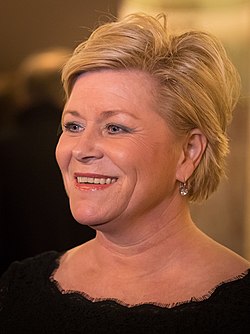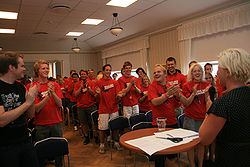Siv Jensen | |
|---|---|
 Jensen in 2017 | |
| Minister of Finance | |
| In office 16 October 2013 –24 January 2020 | |
| Prime Minister | Erna Solberg |
| Preceded by | Sigbjørn Johnsen |
| Succeeded by | Jan Tore Sanner |
| Leader of the Progress Party | |
| In office 6 May 2006 –8 May 2021 | |
| First Deputy | Per Sandberg Sylvi Listhaug |
| Second Deputy | Per Arne Olsen Ketil Solvik-Olsen Terje Søviknes |
| Preceded by | Carl I. Hagen |
| Succeeded by | Sylvi Listhaug |
| First Deputy Leader of the Progress Party | |
| In office 2 May 1999 –6 May 2006 | |
| Leader | Carl I. Hagen |
| Preceded by | Lodve Solholm |
| Succeeded by | Per Sandberg |
| Parliamentary Leader of the Progress Party | |
| In office 28 January 2020 –8 May 2021 | |
| Leader | Herself |
| Preceded by | Hans Andreas Limi |
| Succeeded by | Sylvi Listhaug |
| In office 5 October 2005 –17 October 2013 | |
| Leader | Carl I. Hagen Herself |
| Preceded by | Carl I. Hagen |
| Succeeded by | Harald T. Nesvik |
| Member of the Norwegian Parliament | |
| In office 1 October 1997 –30 September 2021 | |
| Deputy | Mazyar Keshvari |
| Constituency | Oslo |
| Deputy Member of the Storting | |
| In office 1 October 1993 –30 September 1997 | |
| Constituency | Oslo |
| Personal details | |
| Born | 1 June 1969 Oslo,Norway |
| Political party | Progress |
| Alma mater | Norwegian School of Economics |
Siv Jensen (born 1 June 1969) is a Norwegian politician who served as the leader of the Progress Party from 2006 to 2021. She also held the position as Minister of Finance from 2013 to 2020 in the Solberg Cabinet. She was also a member of the Norwegian parliament from Oslo from 1997 to 2021.
Contents
- Early life and education
- Political career
- Member of Parliament
- Party leadership
- Minister of Finance
- Post-political career
- Political views
- Economy
- Israel
- Radical Islam
- Climate change
- Personal life
- Bibliography
- References
- External links
Born and raised in Oslo,Jensen graduated with a degree in business studies from the Norwegian School of Economics. She was first elected to parliament in the 1997 parliamentary election,and has later been re-elected for four consecutive terms. She chaired the parliamentary Standing Committee on Finance and Economic Affairs from 2001 to 2005,and in 2006 succeeded long-time chairman Carl I. Hagen as leader of the Progress Party.
Jensen was the Progress Party's candidate for Prime Minister in the 2009 parliamentary election,which saw record high results for the party. For the 2013 parliamentary election she supported prospects of a coalition government headed by the Conservative Party,and led her party into the Solberg Cabinet,the Progress Party's first ever government participation.
Jensen became Norway's longest-serving Minister of Finance since World War II in October 2019. [1]





